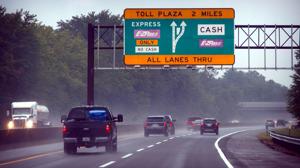Highway safety advocacy group urges New Jersey to strengthen seat belt laws

(The Center Square) – New Jersey missed the top rating on the Advocates for Highway and Auto Safety’s latest state-by-state safety report, which was released this month, for just one reason: its limited enforcement of adults wearing their seat belts in the rear seat.
“New Jersey’s done a great job in enacting the safety laws that Advocates recommends, and really the only reason that New Jersey is not a ‘green’ state is because it’s lacking a primary enforcement rear seat belt requirement,” said Tara Gill, Advocates’ senior director advocacy and state legislation. “Right now, the rear seat belt requirement is secondary enforcement. If the state made a small upgrade to its law to harmonize it with the front seat law and simplify enforcement, New Jersey would move into the green as well.”
Currently, law enforcement officials can’t issue tickets if they just see an adult not wearing a seat belt in the rear seat. Primary enforcement would allow them to do that.
Seventy-nine percent of surveyed rear-seat passengers in 2017 wore a seat belt, according to New Jersey’s Highway Safety Plan for federal fiscal year 2019. But that includes children. Children younger than 8 had the highest usage rate (93%) and children from age 8 to 18 had a usage rate of 70%, but adults in the rear seat had a usage rate of just 48%, the report said.
“Not only does [secondary enforcement] complicate enforcement, it’s also found to be not as effective as primary enforcement,” Gill said. “It’s not as much as a deterrent in getting people to buckle up.”
State legislators are considering several vehicle safety bills this session, including A855, which would prohibit drivers from viewing video streaming and videoconferencing behind the wheel, regardless of who is holding the phone.
“There is no doubt that technology allowed us to stay in touch during a period of social distancing; however, there is a time and a place for everything,” State Assemblyman Nicholas Chiaravalloti (D-NJ, 31st), a sponsor of the bill, said in an Advocates news release. “Each of us knows that it only takes a second for a tragedy to occur.”
Gill said the bill is part of a trend toward addressing gaps in distracted driving gaps laws.
“States are starting to realize that even if they have good distracted driving laws on the books, a lot of them were passed before cell phones had this capability,” Gill said.
Another distracted driving bill this session, SB-1602, would prohibit use of devices while drivers stopped at traffic lights or stop signs. Gill said this is important because of the “cognitive lag effect” that occurs between changes in tasks. Drivers who look at their phones just during the pause in driving may remain distracted for several seconds while they continue on their route, she said.
Other bills under consideration this session are A851, which would establish a five-year pilot program for using speed cameras to enforce speed limits in active work zones, and S1963/A1354, which would require probationary drivers to complete at least 50 hours of practice driving, including 10 hours of nighttime driving, in order to receive an examination permit.
The state is among 30 that have a yellow rating, which indicates that “improvement is needed because of gaps in Advocates’ recommended optimal laws.” Twelve states, including New Hampshire and Vermont, have a red rating, as they “fall dangerously behind” in adopting Advocates’ recommendations. Maine, Delaware, Rhode Island and New York are among the eight states, along with DC, that have a green rating in the report.
Disclaimer: This content is distributed by The Center Square

